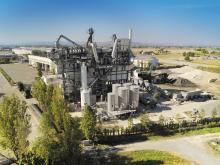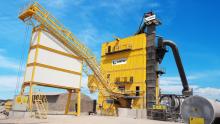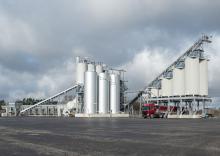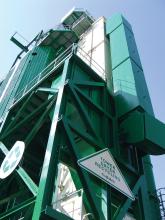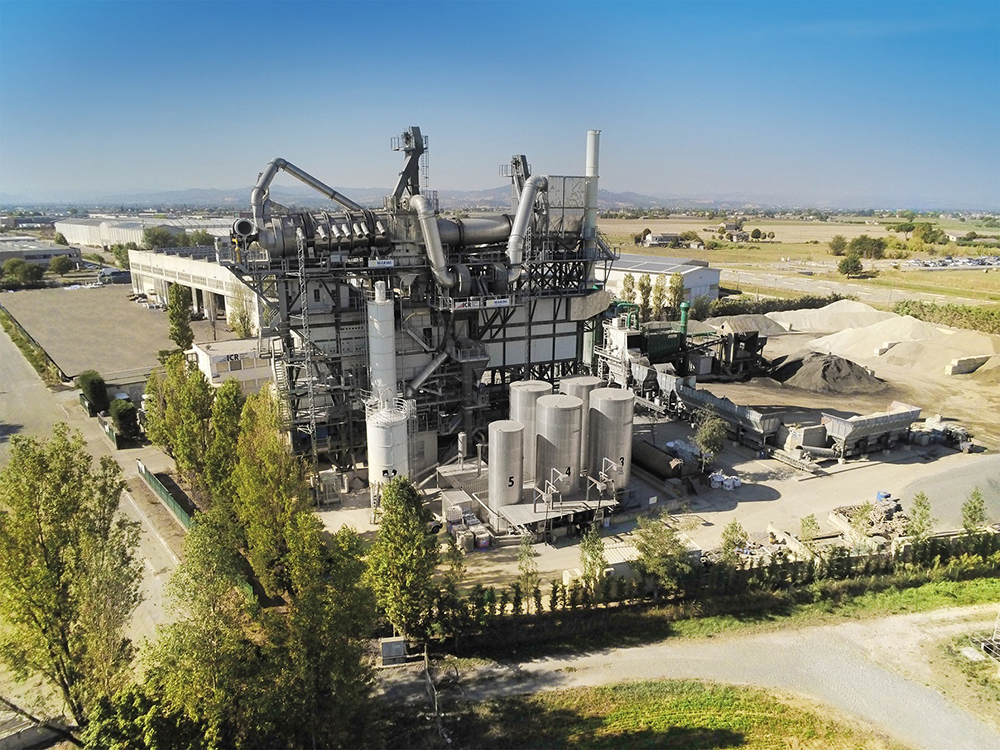
Marini, a Fayat Group company, has been busy explaining the significant sustainability gains of its asphalt-plant solutions to both customers and potential customers.
Established in 1899 in Alfonsine, in the Ravenna province of Emilia-Romagna, Marini is among the world leaders in its field. The company’s comprehensive asphalt-batching-plant range includes the Master Tower, Class Tower, Top Tower, Be Tower, and Xpress. The adjacent Ermont brand also offers continuous asphalt plants in mobile, transferable and stationary types. Additionally, Marini has a polymer modified bitumen (PMB) plant and SAE cold-mix plants, a Fayat Group speciality.
Marini customers can also benefit from the company’s technical services and ZEROVOC production-assisting technology, combining the AeroFILTER with the EvoDRYER system. ZEROVOC delivers effective and efficient asphalt-plant fumes management and treatment of VOC (volatile organic compound) emissions.
AeroFilter is a filtering system for fumes and blue smoke produced at certain points of the asphalt plant, such as the mixer discharge or along the skip track if the plant is fitted with a lateral storage bin plus the truck discharge points.
Filtering takes place in a series of steps, and the oils are recovered in the lower part of the hopper before being evacuated through special tanks without any external dispersion.
The treated fumes can be sent to the plant stack or receive further heat treatment in the EvoDRYER.
As well as the benefits and improved performance with RAP (reclaimed asphalt pavement) use, the EvoDRYER system also provides heat treatment of the fumes, which could contain classified substances such as VOC.
The conveyed air is fed behind the burner flame through a special cylinder entrance.
This patented system means the air is distributed around the external periphery of the combustion chamber where the fumes are said to be quickly and effectively treated, and the residual organic composites of the gases are eliminated.
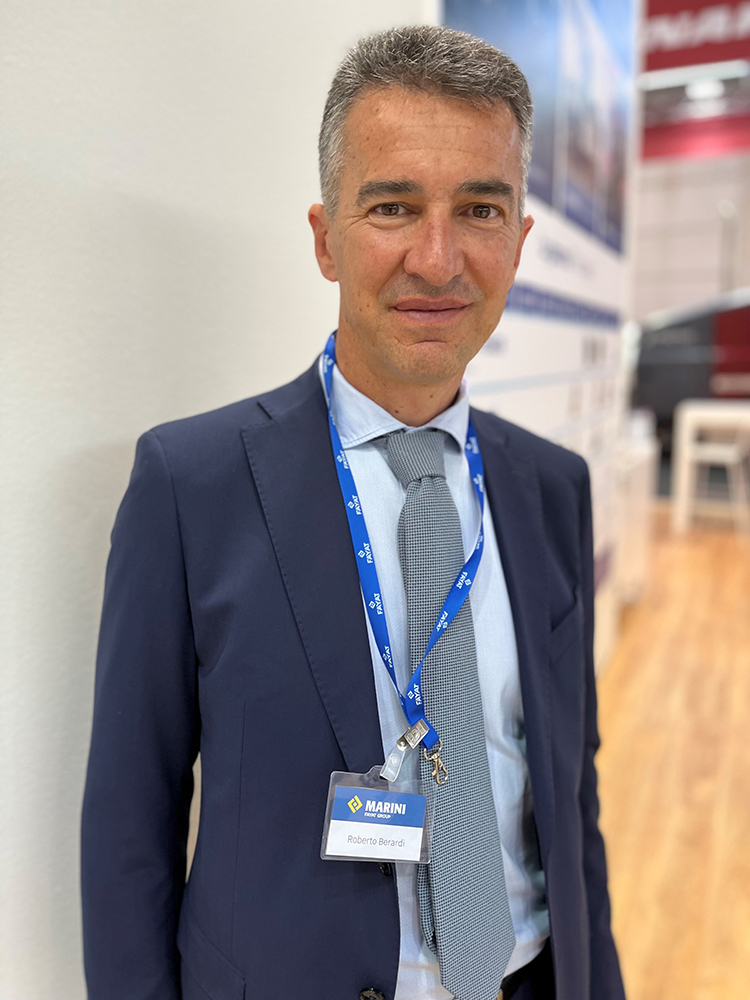 Speaking at Asphaltica, staged in conjunction with the 31st edition of SaMoTer in Verona (3-7 May 2023), Roberto Berardi, Marini-Fayat Mixing Plants product marketing manager (pictured right), says: “Many asphalt producers, particularly bigger companies in France and other countries in northern Europe, are speaking about the need to reduce their carbon emissions and investing in solutions that can do that. Many smaller Italian companies have historically been keen to reduce spending on asphalt plants. We are saying to them, ‘If you spend a bit more, you can greatly reduce the impact on the environment while also reducing your energy and other production costs.’ We are trying to develop different kits and ‘softer’ solutions for these companies.”
Speaking at Asphaltica, staged in conjunction with the 31st edition of SaMoTer in Verona (3-7 May 2023), Roberto Berardi, Marini-Fayat Mixing Plants product marketing manager (pictured right), says: “Many asphalt producers, particularly bigger companies in France and other countries in northern Europe, are speaking about the need to reduce their carbon emissions and investing in solutions that can do that. Many smaller Italian companies have historically been keen to reduce spending on asphalt plants. We are saying to them, ‘If you spend a bit more, you can greatly reduce the impact on the environment while also reducing your energy and other production costs.’ We are trying to develop different kits and ‘softer’ solutions for these companies.”
Berardi continues: “The kits we offer to large and medium-sized customers can be retrofitted to their plants or fitted on a completely new plant. For example, our Master Tower has a patented system that uses up to 100% RAP. The main difference in this system is that it has one burner that heats two drier drums, one for the aggregate and the other for the recycled material. This gives more production flexibility.
“For medium-sized customers, we also offer a parallel [dryer] drum that can be installed on an existing asphalt plant. It guarantees that you stay within permitted emission levels. It is longer, bigger and offers excellent recirculation of air. It means that the flame stays in the centre of the burner and does not come into contact with the material. It means you don’t risk burning the old bitumen in recycled material, and as the drum is longer, you have more time to reach up to 70% of recycled material without an emissions problem.”
Berardi says that domestic-market encouragement to increase the RAP used by Italian highway asphalt-works contractors and the need for better production temperature control may lead to new guidelines that encourage contractors to invest in more sustainability-minded asphalt-plant solutions from Marini and other leading sector players.
Marini’s plant-control software includes kits that optimise the thermal exchange between the hot air created by the flame and the aggregate. “According to the temperature of the fumes, the software automatically adjusts the speed of the dryer-drum’s rotation to maintain the quantity of material inside the drum, which is especially important when working with a percentage of RAP,” explains Berardi.
Berardi says Marini is working on introducing more predictive-maintenance features for its asphalt-plant range. “They involve sensors that analyse plant-support-bearing vibrations and trigger alerts if they exceed a certain level. This allows technicians to make necessary changes to components. This is very useful for customers, especially those running just one or two plants, who may not have the same experienced plant-maintenance people they used to.”
Commenting on the health of the Italian-asphalt plant and supporting-services market, Berardi says: “Generally, the market is good. The last two or three years have seen big fiscal incentives offered by the Italian government and the EU, encouraging customers to invest. The incentives are now less, so the market presents new challenges. However, we can continue doing good business in machine sales and servicing existing customer asphalt plants.”
Asphalt-plant manufacturers have made great strides to reduce emissions over the last decade. Advanced baghouse filters, improved combustion processes and alternative fuel sources are among the improvements.
And now, emissions reductions are being fought on a new front: during the loading process. Ammann is leading the industry in these efforts with Ammann Blue Smoke Treatment (BST).
BST captures vapours that previously escaped during loading. With BST, the trapped fumes undergo a filtration process where oily particles are removed, and the remaining gas streams are sent to the burners.
“BST is a win for plant owners on all counts,” said Mathias Halter, Ammann’s sales director for Europe, the Middle East and Africa. “It’s the answer the industry has been looking for.”
Blue-smoke emissions have been around since the advent of asphalt-mixing plants. The smoke released during loading resulted from the extremely high temperatures required in production.
The temperatures were a necessity. Therefore, little could be done to stop the smoke.
New regulations are requiring that steps be taken to mitigate blue-smoke fumes. It’s a challenge for industry professionals, but Ammann has found an answer with BST.
• BST captures the fumes and redirects them to a multi-stage filtration system.
• The filters remove the oily particles during multiple filtration stages, ensuring high efficiency and allowing the remaining gases to be re-used in the combustion process.
• The condensed oil that accumulates in the filtration system can be recycled.
• BST enables a steady flow rate at the chimney, a key factor in controlling NOx and CO emissions. Therefore, BST is not a case of solving one problem and creating another.
BST is a cost-effective solution. The filtration system is highly efficient and inexpensive and does not require complex and costly confinement methods.
The BST system is green from start to finish. Diffuse emissions are removed, pleasing those at the plant – including operators, haul truck drivers and other workers near the loading dock. Those who live near the plant are thrilled at removing the fumes.
This new innovative technology by Ammann is already in use with expected results in several of the company’s plants.
“This is a significant development on the sustainability front,” said Marzio Ferrini, Ammann’s product marketing manager. “Blue smoke is a challenge the industry has faced for years – and Ammann has found an answer.”
Lintec CSM containerised asphalt-mixing plants have played a major role in helping to improve local transport conditions by opening up central Pakistan's north-south traffic arteries of the Peshawar-Karachi motorway (PKM).
Lintec & Linnhoff China sold two Lintec CSM4000 containerised asphalt-mixing plants to established customer PowerChina Group to support the construction of KPM's 392km M-5 section.
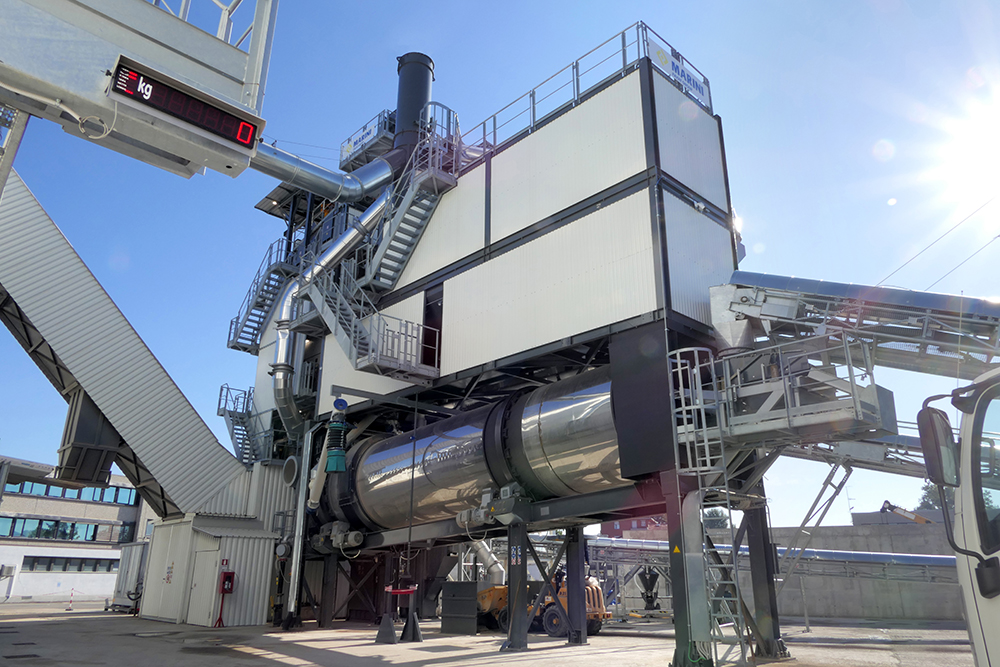
The asphalt-mixing plants were installed in December 2017 and March 2018, with the first providing 34.1km of new asphalt road and the second covering a stretch of 29km, with three lanes in either direction. Both plants had produced over 600,000 tons of hot-mix asphalt by the time the project was completed in November 2019, 13 days ahead of the 36-month schedule. The new M-5 section of KPM is helping slash travel time from Sukkur to Multan by two thirds.
During the construction of this large-scale project on Pakistan's longest motorway, there was a lot of demand for the asphalt-mixing plants' rapid assembly and disassembly capabilities and mobility. These challenges proved no problem, as Lintec's CSM range offers clear advantages, with its 100% ISO shipping-container design facilitating easier and more economical transport and removing the need for concrete foundations. The pre-assembled modular construction also speeds up assembly.
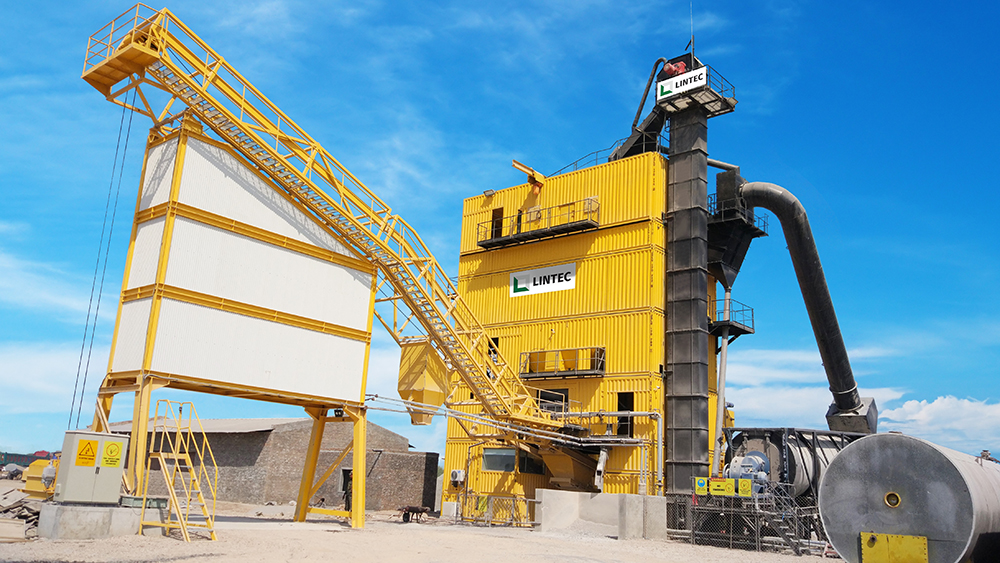
"We had already purchased several Lintec asphalt-mixing plants, including the CSM and CSD models, for other international aid projects since 2010, so we knew we could easily achieve a fast set-up time," said Mr Chen, project manager at PowerChina. "But just as important was knowing we could depend on reliable performance and smooth operation because these were challenging conditions, with the local temperature passing 40°C, which can damage some equipment. To adapt to the local high-temperature environment, the project adopted a new standard of rutting-resistance technology for road asphalt mix at 80˚ C. Due to the high batching accuracy of the Lintec CSM4000 asphalt-mixing plants, this recipe was smoothly implemented, ensuring excellent quality of the road surface."
To adapt to the extreme environment and heavy workloads, the project adopted a new standard of rutting-resistance asphalt for the road surface, capable of withstanding high temperatures up to 80°C. Due to the high batching accuracy of the CSM4000 AMPs, this recipe could be smoothly implemented, ensuring consistently high quality for the surface and providing resistance against even extreme floods.
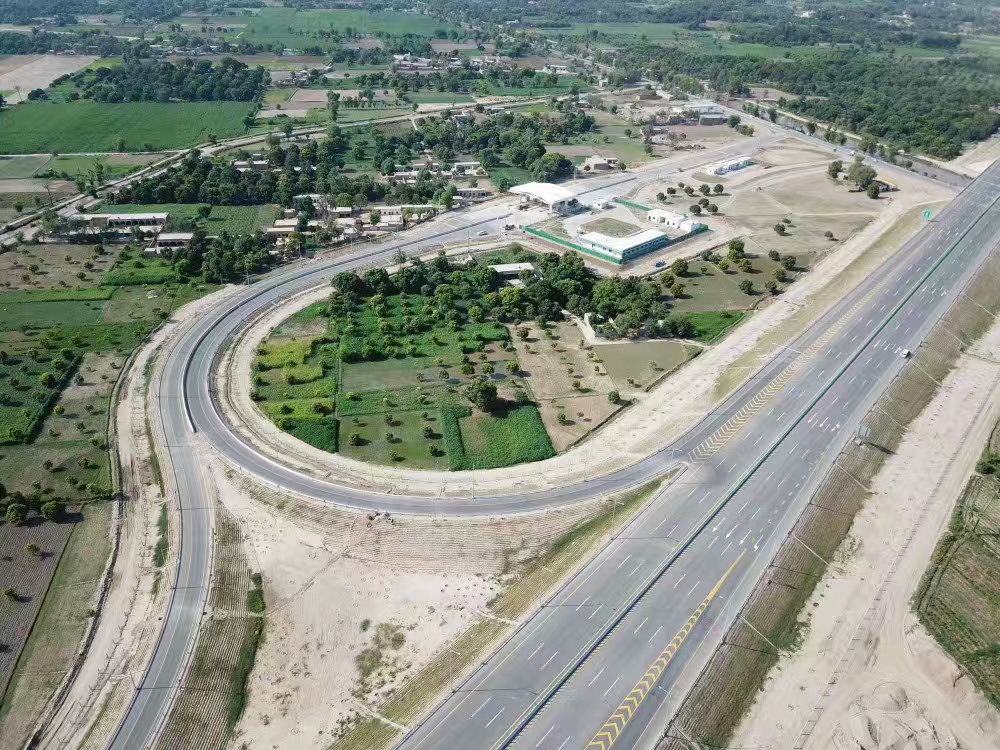
"As a state-owned enterprise working on an international aid project, our client places the greatest importance on the production safety and stability of its equipment," said Tony Liu, CEO of Lintec & Linnhoff China. "Lintec's reputation as a leading brand of German heritage gained widespread recognition and a reputation for safe operation, batching accuracy and mobility performance. This is why we are an ever-present partner in projects under China's Belt and Road Initiative."
The 1,152km, US$2.889bn PKM expressway originates in Karachi, passes through Lahore, and terminates at Peshawar in the northwest Khyber Pakhtunkhwa (KPK) province. As the China-Pakistan Economic Corridor's largest transport infrastructure project, it is speeding up access to China's western border.

